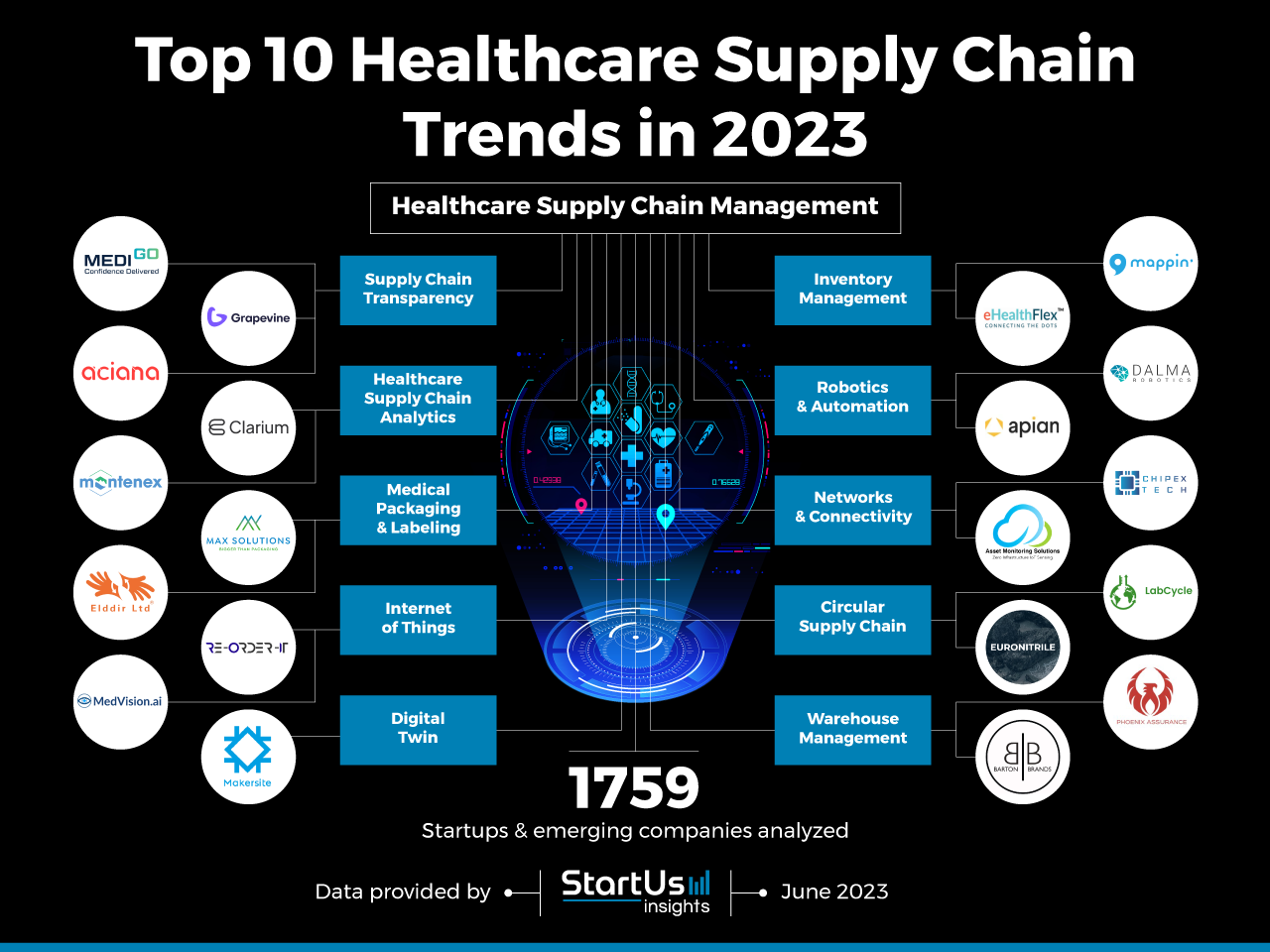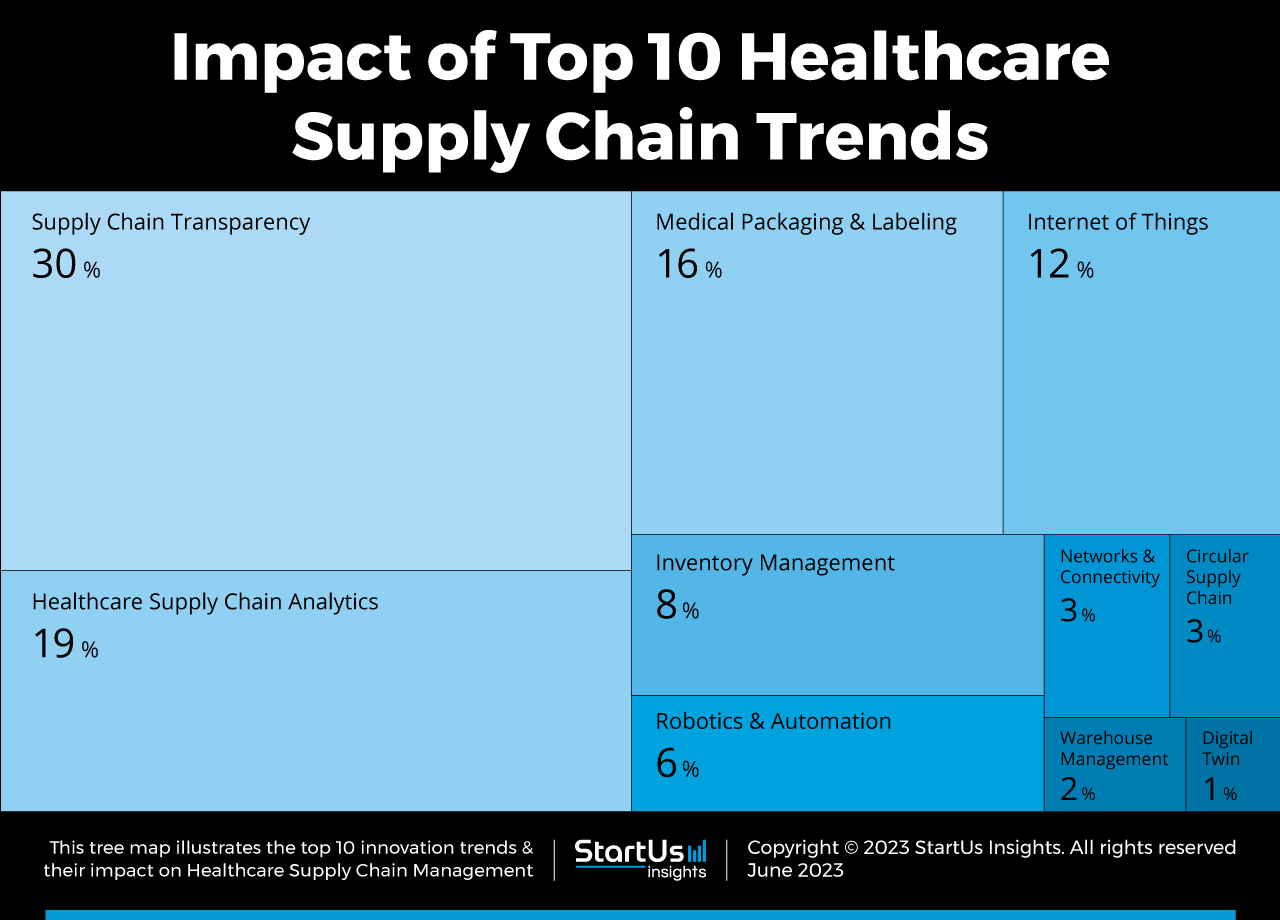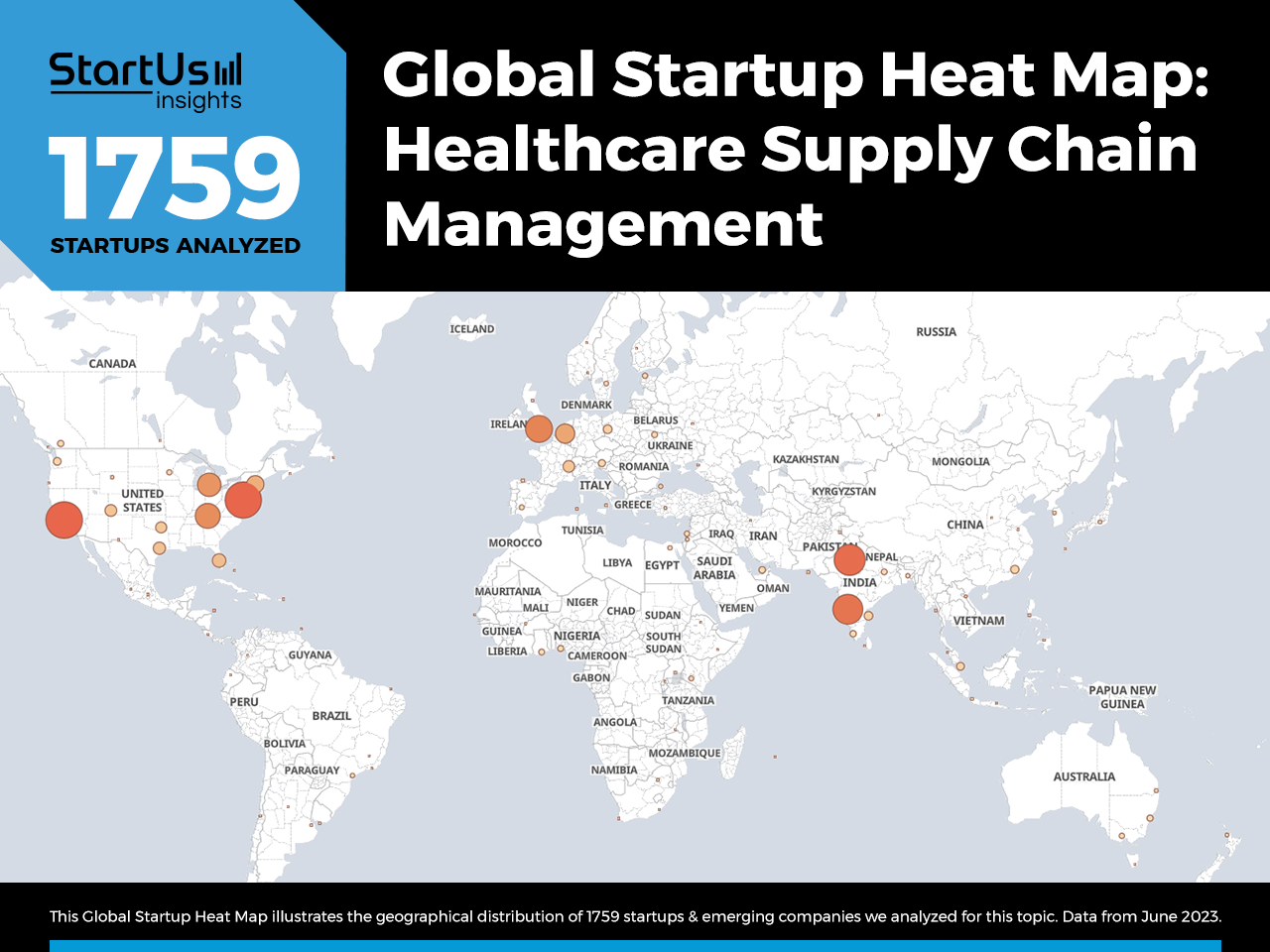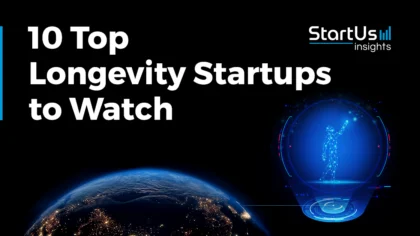Accelerate Productivity in 2025
Reignite Growth Despite the Global Slowdown
The integration of advanced technologies into healthcare supply chains enhances efficiency, reduces cost, and improves patient care. Recent innovations include blockchain, the Internet of Things (IoT), and robotics. Their application in healthcare supply chain management increases transparency, traceability, and security. This industry research focuses on the top 10 trends in healthcare supply chain management based on our analysis of 1759 emerging companies. Read more to explore how each trend impacts healthcare supply chain operations and improves care delivery.
Innovation Map outlines the Top 10 Healthcare Supply Chain Trends & 1759 Promising Startups
For this in-depth research on the Top Trends in Medical Supply Chain Management, we analyzed a sample of 1759 global startups & scaleups. This data-driven research provides innovation intelligence that helps you improve strategic decision-making by giving you an overview of emerging technologies in the healthcare industry. In the Healthcare Supply Chain Innovation Map, you get a comprehensive overview of the innovation trends & startups that impact your company.
These insights are derived by working with our Big Data & Artificial Intelligence-powered StartUs Insights Discovery Platform, covering 3 790 000+ startups & scaleups globally. As the world’s largest resource for data on emerging companies, the SaaS platform enables you to identify relevant technologies and industry trends quickly & exhaustively.
Tree Map reveals the Impact of the Top Healthcare Supply Chain Trends
Based on the Healthcare Supply Chain Innovation Map, the Tree Map below illustrates the impact of the Top 10 Trends in Healthcare Supply Chain Management. Healthcare businesses are ensuring transparency in supply chains for quality assurance, regulatory compliance, and patient safety. Innovations in medical packaging and labeling fulfill sustainability concerns while smart packages leverage radio frequency identification (RFID), near field communication (NFC), or quick response (QR) codes to enable real-time medical product tracking and monitoring. Real-time data on parameters like temperature, humidity, location, and inventory levels further empower data analytics solutions to support decision-making. This removes bottlenecks and improves operations. Additionally, robots automate various tasks in warehouses, distribution centers, and fulfillment operations. They efficiently handle tasks such as picking, packing, sorting, and inventory management. Circular supply chain solutions also reduce the environmental impact of healthcare operations by minimizing waste generation.
Top 10 Healthcare Supply Chain Trends (2024)
- Supply Chain Transparency
- Healthcare Supply Chain Analytics
- Medical Packaging & Labeling
- Internet of Things
- Inventory Management
- Robotics & Automation
- Networks & Connectivity
- Circular Supply Chain
- Warehouse Management
- Digital Twin
Global Startup Heat Map covers 1759 Healthcare Supply Chain Startups & Scaleups
The Global Startup Heat Map below highlights the global distribution of the 1759 exemplary startups & scaleups that we analyzed for this research. Created through the StartUs Insights Discovery Platform, the Heat Map reveals high startup activity in the US and India, followed by the UK. Below, you get to meet 20 out of these 1759 promising startups & scaleups as well as the solutions they develop. These healthcare supply chain companies are hand-picked based on criteria such as founding year, location, funding raised, & more. Depending on your specific needs, your top picks might look entirely different.
Top 10 Trends in Healthcare Supply Chain Management
1. Supply Chain Transparency
Transparency in the healthcare supply chain improves the visibility and accessibility of movement and sourcing of healthcare products or services. This ensures that all stakeholders have access to timely information about the origin and quality of healthcare products. For example, the implementation of track and trace technologies, like barcodes, RFID tags, and serialization, allows healthcare institutions to monitor product movement throughout the supply chain. Blockchain further authenticates and maintains a tamper-proof record of supply chain transactions. IoT devices, such as sensors and smart tags, integrated into supply chain processes collect real-time data on temperature, humidity, location, and other parameters. These data sources streamline supplier audits and certifications while providing an additional layer of transparency and accountability. This way, transparency mitigates risks associated with counterfeiting or substandard medical products, thereby improving patient safety.
MediGO aids Organ Donation Workflow Monitoring
US-based startup MediGO improves the transparency of organ shipments. Its platform, OPO Delivery Management, offers visibility for all parties involved in the transportation of organs from donors to transplant centers. This allows organ procurement organizations (OPOs) and donor hospitals to coordinate logistics, communication, estimated time of arrivals (ETAs), and more. The startup’s other platform, Recovery Teamlink, provides location visibility, event-based communication, and collaboration with transplant recovery teams. This leads to better patient care coordination.
Grapevine Technologies facilitates Medical Supply Chain Collaboration
US-based startup Grapevine Technologies offers a software solution that connects manufacturers, hospitals, and other healthcare companies directly with wholesale suppliers. As big suppliers charge higher, the startup’s platform connects healthcare businesses with smaller suppliers that sell the same products at wholesale prices. It also allows purchases from multiple suppliers in one checkout, thereby increasing convenience for buyers. Moreover, the startup’s platform enables working with vetted suppliers, reducing the time and risks associated with sourcing new medical products.
aciana simplifies Medical Device Tracking
US-based startup aciana makes a blockchain platform to track healthcare devices throughout their life cycle. This platform supports a wide range of medical devices, including the Internet of Things in health and wellness devices like trackers, pedometers, sugar level monitors, blood pressure monitors, and more. Leveraging the data provided by each device, the platform automates maintenance contract drafting, which further reduces device downtime and improves patient safety.
2. Healthcare Supply Chain Analytics
Data analytics solutions utilize techniques like statistical analysis, data mining, predictive modeling, and machine learning to generate actionable insights from supply chain data. It provides insights into key performance indicators (KPIs) of the supply chain for better decision-making and identification of areas of improvement. Supply chain analytics also allows healthcare organizations to predict consumption rates, ensure product availability, and minimize excess or shortage of supplies. By analyzing data related to transportation, distribution, and order fulfillment, healthcare institutions implement strategies to reduce costs, enhance delivery speed, and minimize waste. Analytics further allows them to identify potential disruptions such as supplier issues, regulatory changes, or natural disasters, enabling proactive risk management.
Clarium delivers Shared Supply Chain Intelligence
US-based startup Clarium’s platform automates supply chain workflows based on data. It connects real-time data across the supply chain in a unified data ecosystem. This data is analyzed to identify crowdsourced signals and potential operational risks. The platform also improves data transparency into supply and demand, streamlining collaboration and operations.
Montenex enables Intelligent Contract Management
US-based startup Montenex offers AI software for healthcare supply chain contract management. The cloud-based platform performs contract simulations, regression analysis, and contract performance tracking. This allows healthcare organizations to evaluate the financial performance of their contracts or vendors and make data-backed operational decisions.
3. Medical Packaging & Labeling
Advances in medical labeling and packaging are continuously evolving to meet the demands of the healthcare industry. Smart packaging solutions integrated with RFID or NFC aid temperature monitoring and expiration date tracking as well as offer medication adherence reminders. Interactive packaging utilizes QR codes, augmented reality (AR), or digital media, to engage patients and improve their medication understanding. Further, improvements in labeling and packaging prevent counterfeiting. These features include holographic labels, unique identifiers, tamper-evident seals, and advanced packaging materials that are difficult to replicate. Some medical packaging uses intelligent dosing systems that enable precise medication administration to the patient. Such systems include automated pill dispensers, pre-filled syringes, or devices with built-in dosage measurements. Lastly, environmental concerns lead to greater use of recyclable and biodegradable materials to reduce packaging waste.
MAX Solutions offers Specialty Medical Packaging
US-based scaleup MAX Solutions works on a specialty packaging platform for healthcare segments like medical devices, nutraceuticals, pharmaceuticals, and over-the-counter (OTC) medicine. It utilizes computer-to-plate technology for faster and enhanced quality production. The deployment of gamut printing, layout optimization software, and hybrid label printing further improves flexibility. This provides healthcare businesses with customizable packaging options.
Elddir designs Arthritis-friendly Medical Packages
UK-based startup Elddir manufactures arthritis-friendly medical packaging. Commonly available child-resistant packaging is often difficult to use by those suffering from a range of joint and muscle conditions. The startup’s solution is a low-friction form of child-resistant closure which is easily openable, while also preventing children from the risk of accidental poisoning.
4. Internet of Things
IoT devices and sensors gather real-time data about various aspects of supply chain operations. In healthcare, temperature-sensitive products such as vaccines, medications, and biological samples require strict temperature control. IoT sensors continuously monitor the temperature and humidity levels during transport or storage to offer real-time alerts. IoT-enabled smart shelves and cabinets also track inventory levels, expiration dates, and storage conditions. Moreover, connected sensors monitor the performance and condition of machinery used in the healthcare supply chain, enabling predictive maintenance. These applications of IoT in healthcare supply chains simplify data acquisition and, in turn, operations management.
Re-Order-It advances IoT-powered Healthcare Inventory Management
Dutch startup Re-Order-It makes IoT-enabled hardware and software for healthcare inventory management. Its solutions, such as ordering boards, e-kanban systems, and other smart equipment, deploy RFID to optimize stock levels and automate ordering. This reduces the risk of shortages or overstocking. The startup’s software further integrates with warehouse management systems (WMS) or enterprise resource planning (ERP) systems to provide insights into local operations. This facilitates highlighting any unexpected deviations that require prompt attention.
MedVision.ai simplifies Hospital Inventory Management
US-based startup MedVision.ai leverages IoT sensors to manage hospital inventory in real-time. The startup’s solution tracks medical supplies and automates manual inventorying. This ensures that inventory records are up to date and reflect the actual availability of supplies. Its automated processes also streamline inventory management, reducing the time and effort required for manual counting and tracking. Moreover, the startup provides predictive and prescriptive supply-level analytics to suggest ways to improve efficiency.
5. Inventory Management
In healthcare, inventory management ensures the availability of necessary medical supplies, pharmaceuticals, and equipment while minimizing costs and waste. Healthcare companies thus utilize accurate demand forecasting solutions to determine optimal inventory levels. Historical data, market trends, patient demand patterns, and input from healthcare providers power such systems. This approach prevents stock-outs or excess inventory. Implementing barcoding, RFID, or IoT sensors further enables real-time tracking of inventory movements. This provides accurate visibility into inventory levels, location, and usage. Businesses leverage cloud-based inventory management platforms that offer centralized data storage, real-time accessibility, and collaboration among supply chain stakeholders. Further, with a vendor-managed inventory (VMI) approach, healthcare suppliers have access to inventory data and take responsibility for ensuring adequate stock levels. As a result, it reduces the burden on healthcare facilities.
Mappin enables Automated Clinic Inventory Management
Japanese startup Mappin provides a clinic inventory management application, Pitto, to maintain medical supplies. It offers stock status, features an automatic order function, and delivers a digital report on spending, along with order history and storage use. This enables medical professionals to reduce workloads and management costs.
eHealthFlex simplifies Hospital Inventory Management
Indian startup eHealthFlex works on a customizable hospital inventory management system. It handles procurement, vendor selection, and stock-level management. This way, the system improves control over inventory levels, reduces waste, and streamlines workflow processes related to inventory management. It also allows maintaining orders from various vendors, enabling diverse product selection and competitive pricing.

6. Robotics & Automation
Robotic systems automate various tasks within warehouses and distribution centers. In healthcare facilities, robots optimize medication dispensing which also tracks inventory levels, alert staff when restocking is required, and ensure proper storage conditions. Robots equipped with sensors or scanners track product movements and capture data such as batch numbers, expiration dates, and handling conditions. This data is essential for ensuring regulatory compliance, facilitating recalls or audits, and improving overall supply chain transparency. Moreover, autonomous delivery robots transport medications, lab samples, or medical supplies within healthcare facilities, reducing delivery times and human contact. Drones enable rapid delivery of lightweight and time-sensitive items, such as emergency medicines, to remote or inaccessible areas, improving access to healthcare.
Dalma Robotics advances Automation Machinery Manufacturing
Portuguese startup Dalma Robotics makes HARP, an autonomous mobile robot (AMR) for hospitals, clinics, and labs. Being lightweight and compact allows HARP to navigate through narrow spaces, crowded areas, and complex environments more easily. The robot transports supplies, medications, and equipment within the hospital. This saves time for healthcare professionals and reduces the burden of manual transportation. It is also employed for the collection and disposal of waste, reducing the risk of contamination and improving hygiene in the hospital environment.
Apian accelerates Medical Logistics
UK-based startup Apian develops drones for medical logistics. The startup’s range of drones features electric propulsion, fixed-wing hybrid VTOL (vertical take-off and landing), multi-rotor, and more to fulfill both long and short ranges effectively. These drones enable faster and greener deliveries of medical supplies and tests to patients and clinicians. Aerial deliveries also reduce traffic on roads and improve access to healthcare in remote places.
7. Networks & Connectivity
High-speed networks, like 5G, enable real-time communication between different stakeholders in the healthcare supply chain. This facilitates faster decision-making and improved collaboration. Moreover, advanced networks allow the seamless exchange of medical data such as inventory levels, order statuses, demand forecasts, and tracking information. With the help of these networks, healthcare organizations remotely monitor the status or location of critical assets in the supply chain. This includes tracking the movement of medical equipment, pharmaceuticals, and supplies. Networks provide the connectivity required for the seamless operation of IoT devices as well as enable real-time computations. They also employ security protocols to ensure the privacy and integrity of sensitive healthcare data, maintaining the confidentiality of patient information.
Chipex Tech advances the Internet of Health Things (IoHT)
Indian startup Chipex Tech offers semiconductor and WiFi solutions to advance IoHT. It integrates WiFi into a system-on-chip (SoC) to make healthcare IoT deployment easier. This ensures secure connectivity to support the use of WiFi-enabled devices like wearables, smartphones, tablets, and more. Moreover, the startup’s solution aids online patient check-in, appointment scheduling, communication with doctors, and vitals monitoring.
Asset Monitoring Solutions creates Real-Time Location Systems (RTLS)
US-based startup Asset Monitoring Solutions provides IoT sensing for real-time location systems and wireless temperature monitoring of healthcare cold chains. Its sensor, AntTail, monitors the temperature of medicines and displays it on a Bluetooth-enabled smartphone over a 4G gateway. The startup’s other product, Sentinel Next, is a WiFi-based sensor for the real-time monitoring of hospitals, laboratories, and pharmaceutical manufacturing sites. These sensors allow healthcare businesses to ensure quality compliance with healthcare products and receive real-time alerts on the environment where assets are deployed.
8. Circular Supply Chain
Designing healthcare products and equipment with a focus on circular economy involves considering factors such as durability, reparability, and ease of disassembly. This way, a circular healthcare supply chain extends the lifespan of products and allows components to be easily reused or recycled. Reprocessing or reusing single-use medical devices thus reduces the negative environmental impact of healthcare operations. Additionally, sustainable packaging utilizes recyclable or biodegradable materials, right-sized packaging, and minimalistic designs to reduce wastage. Innovative waste management techniques, such as waste-to-energy (WTE), upcycle non-recyclable or non-hazardous healthcare waste into high-value products.
LabCycle advances Hazardous Plastic Waste Recycling
UK-based startup LabCycle develops solutions for recycling hazardous plastic waste from safety level 1 and 2 labs. The startup’s process involves sorting the single-use waste based on colors or materials, proprietary decontamination of lab plastics, and recyclability. The recycled lab plastics are then used to create new products. This way, the startup ensures a circular economy and prevents incineration and landfill disposal of such wastes.
EuroNitrile facilitates Biomedical Disposables Management
Dutch startup EuroNitrile works with hospitals and healthcare organizations to design biomaterials for healthcare applications. The startup’s biomaterials replace petrochemical-based resources in medical equipment and reduce healthcare waste. This leads to the decarbonization of medical supply chains.
9. Warehouse Management
Warehouse management in healthcare settings involves the storage, handling, and distribution of medical products and equipment. An organized warehouse layout allows efficient movement and accessibility of items. Companies offer quality control measures in warehouses, including inspections, temperature monitoring, and adherence to storage requirements, for proper handling of medical products. For instance, cloud-based warehouse management systems enable real-time inventory visibility, order tracking, and supply chain performance monitoring. Effective inventory management is essential in healthcare warehouses to ensure optimal stock levels and minimize product recalls. Further, technologies, like automated guided vehicles (AGVs) and robotic picking systems, automate inventory counting, sorting, packing, and more. These innovations reduce manual labor, minimize errors, and improve overall warehouse efficiency.
Phoenix Assurance optimizes Healthcare & Pharmaceutical Logistics
US-based startup Phoenix Assurance provides warehousing and logistics services to healthcare stakeholders. It offers real-time monitoring of facilities using motion detectors, shock or vibration detectors, cameras, and more. This helps mitigate various risks, such as leaks, fires, or security breaches, associated with pharmaceutical warehousing. The startup also provides controlled room temperature for the safe storage of medical drugs and chemicals.
Barton Brands provides a Medical Warehousing Service
Australian startup Barton Brands offers distribution and warehousing services to the healthcare and pharma industries. It provides flexible storage, distribution, and pick-and-pack solutions. The startup also enables a competitively priced distribution service through its transport network for healthcare companies to reduce upfront costs.
10. Digital Twin
Digital twins offer a visual representation of the entire healthcare supply chain network, including manufacturing facilities, warehouses, and distribution centers. They allow healthcare supply chain managers to simulate changes in demand, supplier disruptions, and transportation delays. This allows healthcare businesses to evaluate supply chain resilience and devise contingency plans. Technologies like AR and virtual reality (VR) are integrated with digital twins to enhance remote training and personnel support, thus improving efficiency and reducing costs. Robotic systems are also connected to the digital twin to automate tasks such as picking, packing, and sorting in warehouses. This integration reduces human errors and enhances overall supply chain productivity.
Makersite develops a Supply Chain Digital Twin
German startup Makersite’s AI makes digital twins of healthcare supply chains. The platform provides actionable insights for decision-making, cost optimization, process evaluation, and multiple scenario comparisons. This allows supply chain stakeholders to eliminate risks by selecting more efficient processes. Moreover, the digital twin offers insights into scope 1, 2, and 3 carbon emissions and how to reduce them, thereby enabling sustainable procurement.
Discover all Medical Supply Chain Trends, Technologies & Startups
Effective healthcare supply chain management ensures the availability of safe and quality medical products, equipment, and services for patients. It plays a crucial role in patient safety by preventing the distribution of counterfeit or substandard products. The industry is witnessing increasing adoption of IoT, robotics, digital twin, and more. Moreover, effective supply chain management contributes to cost optimization by minimizing procurement expenses, reducing waste, and streamlining inventory levels. The new trends in healthcare supply chains outlined in this report only scratch the surface of trends that we identified during our data-driven innovation & startup scouting process. Identifying new opportunities & emerging technologies to implement into your business goes a long way in gaining a competitive advantage.











